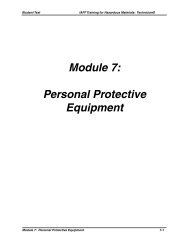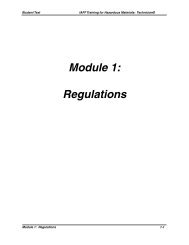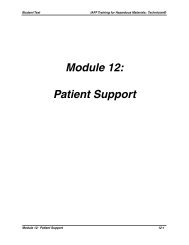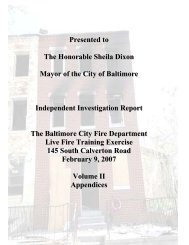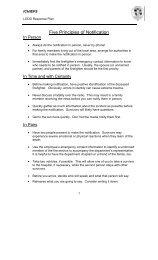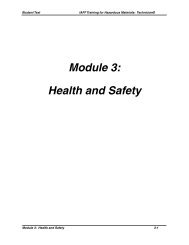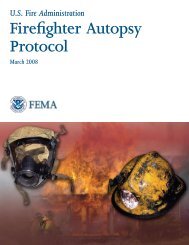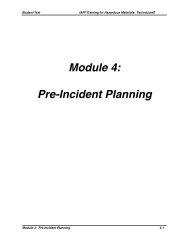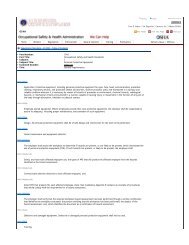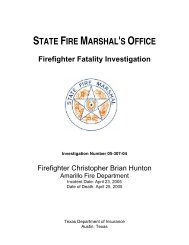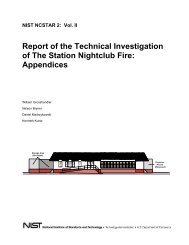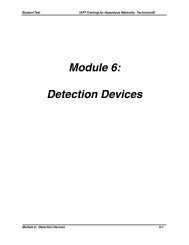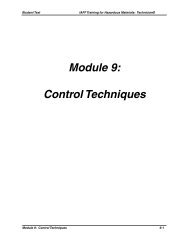2011 Fire Fighters Issues Book.pmd - IAFF
2011 Fire Fighters Issues Book.pmd - IAFF
2011 Fire Fighters Issues Book.pmd - IAFF
Create successful ePaper yourself
Turn your PDF publications into a flip-book with our unique Google optimized e-Paper software.
KEY POINTS<br />
PUBLIC SECTOR PENSIONS<br />
• Contrary to media reports, most public sector pension systems are on sound financial footing. While the downturn<br />
in the stock market has posed challenges, most plans will be able to recoup their losses without making changes in<br />
benefits or contributions. Those plans that need to make changes are already doing so.<br />
• Underfunding of plans is due largely to the failure of state and local governments to make their required annual<br />
contributions during good times. It is wrong to punish beneficiaries of pension plans for the failure of their<br />
employer to live up to their obligations.<br />
• Many states are facing severe budget shortfalls, but this has nothing to do with their pension system. Only 3% of<br />
state expenditures are related to employee pensions.<br />
• Defined benefit pension plans are a fair and cost-effective system of providing retirement security to workers.<br />
More than 70% of pension funds come from employee contributions and earnings on prudent investments, with<br />
tax dollars accounting for only about a quarter of the funds.<br />
• Efforts to convert defined benefit (DB) plans to defined contribution (DC) plans are shortsighted. DB plans are<br />
superior to DC plans in several important ways:<br />
o<br />
o<br />
o<br />
o<br />
DB plans have much greater return on investments than DC plans.<br />
DB plans have lower administrative costs than DC plans.<br />
DB plans include disability and survivor benefits, which provide retirement security for the families of<br />
fire fighters who are injured or killed in the line of duty.<br />
DB plans weather the ups and downs of the stock market better than DC plans, and do not penalize<br />
workers who reach retirement age during a market downturn.<br />
• <strong>Fire</strong> fighters would be especially hard hit if public sector DB plans were dismantled. <strong>Fire</strong> fighters have negotiated<br />
unique pension systems that account for their early retirement ages and high rates of disability. Moreover, most<br />
fire fighters are not covered by Social Security, and many are covered by mandatory retirement age requirements.<br />
DB plans provide for retirement security in ways DC plans cannot.<br />
• <strong>Fire</strong> fighter pensions are not overly generous, as some have claimed. The average pension received by a fire<br />
fighter is less than $35,000. The anecdotes about huge pension benefits are anomalies that need to be addressed<br />
in the context of that specific pension plan, and do not warrant changes in federal law.<br />
• The shift in recent years from DB to DC plans in the private sector has undermined the retirement security of<br />
millions of Americans. The gap between the amount of savings American workers need for retirement and the<br />
amount they are currently projected to have is an astonishing $6.6 trillion. Impoverished retirees will harm our<br />
economy and increase dependence on government assistance.<br />
• Congressional proposals to require “transparency” are unnecessary since state laws already require disclosure.<br />
The real intent behind such proposals is to exaggerate shortfalls and force states to dismantle their DB plans.<br />
• Allowing states to declare bankruptcy to avoid paying retirees the pensions they have earned would be unfair to<br />
workers, and could wreak havoc with state and municipal finances.<br />
5



